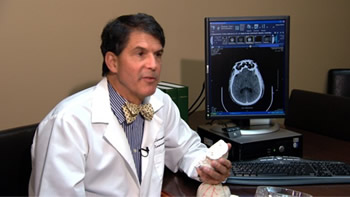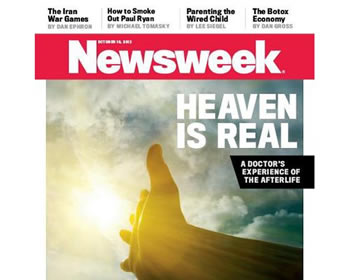Behind the Veil of Everyday Life:
A Neurosurgeon's Near Death Experience
For Sunday February 10, 2013
Lectionary Readings (Revised Common Lectionary, Year C)
Exodus 34:29–35
Psalm 99
2 Corinthians 3:12–4:2
Luke 9:28–36 (37–43)
On November 10, 2008, Eben Alexander was admitted to the Lynchburg General Hospital emergency room with excruciating back pain. Within four hours he slipped into a deep coma that lasted seven days. At the end of those seven days, he opened his eyes and thrashed around in bed. After the doctor removed his ventilator, Alexander took his first unassisted breath in a week, calmed down, and then said, "thank you." Looking around the room at his family and doctors, he smiled and said, "All is well. Don't worry, all is well."
Alexander's book about his Near Death Experience, Proof of Heaven (2012), rocketed to #1 on the New York Times best-seller list. Oprah did an hour-long special about it. The publisher has printed a million copies.
Before his NDE, Alexander was a friendly sceptic. He wasn't religious, and only went to church on Christmas and Easter. He had spent twenty-five years as a neurosurgeon, including fifteen years at Harvard Medical School. He had published over 150 peer-reviewed scientific articles. Faith in empirical science was his only creed.
 |
Eben Alexander. |
His eventual diagnosis was so rare that he made medical history. Somehow he had contracted spontaneous E. coli bacterial meningitis. The doctors never determined how or why. No one could find even one other case like his. "Officially, my status was 'N of 1,' a term that refers to medical studies in which a single patient stands for the entire trial."
Alexander's prognosis was catastrophic. His type of meningitis was almost always fatal, and so his doctors gave him little chance for recovery. His brain's neocortex had shut down; he describes it as "inoperative." It wasn't that his brain was working improperly or poorly, he says, but that "it wasn't working at all" (his emphasis).
Such was Alexander's medical condition. But his book is mainly about the "profound spiritual experience" he had when he was "completely free of the limitations of my physical brain." Whereas Alexander has no memory of any events during the week of his coma, he retains absolute clarity about what happened "outside my brain." He now believes something that's antithetical to the materialist model of all brain science — that consciousness exists entirely independent of the brain.
I won't spoil the story, nor address the fire storm of controversy his book has ignited. Suffice it to say that Alexander gives a vividly detailed description of his NDE. "We will show you many things," an angelic being told him, "but you will be going back." One message in particular was more important than all the rest.
 |
Alexander and Oprah. |
Alexander compares his NDE to lifting a veil. A veil can function like a filter, and so can the brain. Although the spiritual realm beyond the brain is available to us, "during the brain-based, physical portion of our existence, our brain blocks out, or veils, that larger cosmic background, just as the sun's light blocks the stars from view each morning." This brain-filtering is good and necessary for life on earth; imagine if you always heard every sound at once. But this brain filtering also obscures the more important realm of the spirit, unless we take deliberate steps to see "beyond the veil."
When Moses came down from Mount Sinai after forty days and forty nights, "his face was radiant because he had spoken with the Lord." He had been radically transformed by his direct encounter with the infinite God. People were scared to look at him or even come near him. It was too much, and so we read that "Moses put a veil over his face." In this case, the veil "filtered" the unbearable glory of God.
In the Transfiguration story, as Jesus was praying, "the appearance of his face changed, and his clothes became as bright as a flash of lightning" — an obvious allusion to Moses on Mount Sinai. Whether this was an ecstatic vision, or whether Jesus was literally "metamorphosed" before their eyes, the natural phenomenon of blinding light was secondary to the supernatural affirmation of the voice from the cloud — this Jesus is God's beloved and specially anointed Son: "Listen to him!"
In the Transfiguration story, Jesus is the New Moses. In Paul's letter to the Corinthians, he's also the mediator of a new covenant. Paul says that "we are not like Moses, who veiled his face." In fact, "whenever anyone turns to the Lord, 'the veil is taken away'" (Paul quotes Exodus 34:34). And so we, "who with unveiled faces all reflect the Lord's glory, are being transformed into his likeness." In this instance, there's a veil that doesn't merely filter but that obscures, and therefore needs to be removed.
Today we live in a society that the novelist David Foster Wallace described as one of Total Noise. The Super Bowl is only one example of hyper-stimulation and information overload. Total Noise, said Wallace, is both euphoric and numbing. It's way too much to organize or understand. Which is to say that it obscures or veils all those things in life, like the realm of the spirit, that are necessary for being fully human.
 |
Newsweek on Alexander's story. |
In her 2011 essay for JwJ on the Transfiguration, Amy Frykholm writes that "learning to see in new ways is one of the most difficult tasks of the transformed life. Old habits of selective vision, old choices about what to leave out and what to focus on tend to dominate us, even as we search for new ways of living that are in closer communion with the life of the Spirit. Transfiguration — that mysterious transformation of vision that is narrated in today’s readings — is a radical, if brief, way of illumination."
"As we move between the extraordinary accounts of Transfiguration in today’s readings and the ordinary events of seeing in our own lives, we do not need to collapse the two. But we can remember that the light of God is not so hidden that we cannot see it in ordinary life. The Logos lives, enlivens, infuses, illuminates even the ordinary."
The title of Alexander's book is unfortunate. No amount of debate can conclude whether there's a "heaven" beyond normal consciousness. To me this doesn't matter, because I already believe that. What's important is not Alexander's medical miracle but his spiritual message — that despite this veil of tears which is life, and whether you feel it or not, nothing can separate you from the Perfect Love that exists at the heart of the universe. "This is the reality of realities," he writes, "the incomprehensibly glorious truth of truths that lives and breathes at the core of everything that exists or that ever will exist."
To experience this, in the ordinary or the extraordinary, is to be radically transformed in the here and now.
For further reflection:
From Songs for Coming Home (Many Rivers Press, 1984).The Opening of Eyes, by David Whyte
That day I saw beneath dark clouds
the passing light over the water
and I heard the voice of the world speak out,
I knew then, as I had before
life is no passing memory of what has been
nor the remaining pages in a great book
waiting to be read.It is the opening of eyes long closed.
It is the vision of far off things
seen for the silence they hold.
It is the heart after years
of secret conversing
speaking out loud in the clear air.It is Moses in the desert
fallen to his knees before the lit bush.
It is the man throwing away his shoes
as if to enter heaven
and finding himself astonished,
opened at last,
fallen in love with solid ground.
Image credits: (1) ABCNews.com; (2) WashingtonPost.com; and (3) Popsci.com.





